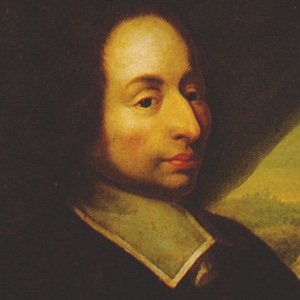
Blaise Pascal (1623 – 1662) was a French mathematician, physicist, inventor, writer and Catholic theologian. He was a child prodigy who was educated by his father. Pascal’s early work, in the fields of hydrodynamics and hydrostatics, centered on the principles of hydraulic fluids. His inventions include the hydraulic press and the syringe. Pascal was an important mathematician. He wrote a significant treatise on the subject of projective geometry at the age of 16, and later his correspondence on probability theory strongly influenced the development of modern economics and social science. Pascal’s most influential theological work, referred to posthumously as the Pensees (“Thoughts”), is a collection of fragments on theology and philosophy.

Quotes by Blaise Pascal…
Are you less a slave by being loved and favored by your master?… Your master favors you; he will soon beat you.
We run carelessly to the cliff, after we have put something before us to prevent us seeing it.
The knowledge of God without that of man’s misery causes pride. The knowledge of man’s misery without that of God causes despair.
There are people in the world, who, having renounced all the laws of God and nature, have made laws for themselves which they strictly obey.
We are foolish to depend on the society of our fellow-men… they will not aid us… We should seek the truth without hesitation, and, if we refuse it, we show that we value the esteem of men more than the search for truth.
Notwithstanding the sight of all those miseries which wring us, and threaten our destruction, we have still an instinct that we cannot repress, which elevates us above our sorrows.
Observe yourselves.
The greatness and the wretchedness of men are so evident that the true religion must necessarily teach us both that there is in man some great source of greatness, and a great source of wretchedness. It must then give us an explanation of these astonishing contradictions. In order to make man happy, it must prove to him that there is a God, and we ought to love Him, that our true happiness is to be in Him, and our sole evil to be separated from Him.
Let each one examine his thoughts, and he will find them all occupied with the past and the future. We scarcely ever think of the present, and if we think of it, it is only to take light from it to arrange the future. So we never live, but we hope to live; and, as we are always preparing to be happy, it is inevitable we should never be so.
We do not content ourselves with the life we have in ourselves and in our own being; we desire to live an imaginary life in the mind of others, and for this purpose we desire to shine. We labor unceasingly to adorn and preserve this imaginary existence, and neglect the real. And if we possess calmness or generosity or truthfulness, we are eager to make it known, so as to attach these virtues to that imaginary existence.
